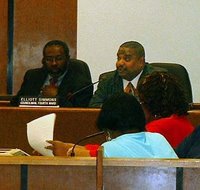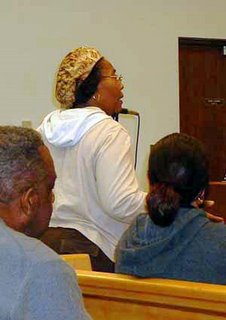Crowded Meeting Ends With Mother's Plea
In a single vote Monday (March 20, 2006), the City Council approved 13 resolutions that included granting full terms to cabinet members and waiving residency requirements, setting comprehensive rules of conduct for the governing body and giving health and pension benefits to same-sex partners.
The council also passed eight ordinances, including one to change the meeting schedule, two to set up youth commissions and one to raise the salaries of Public Works employees.
Residents including Joan Hervey and Sally Hughes thanked the council for the domestic partner legislation. Hervey also read a statement of support from former Mayor Richard L. Taylor, who could not attend the meeting.
On the cabinet appointments, Councilman Cory Storch said over the past 90 days he got to know and appreciate the cabinet members, all of whom came aboard with acting terms. But he asked that future appointments be made as in past administrations, with candidates being interviewed in executive session by the council before confirmation.
The new rules of conduct and a new limit on public comment irked residents Joe and Dottie Gutenkauf and Sandy Gurshman. The Gutenkaufs sent Council President Ray Blanco a six-page memo on the 28 pages of rules for conduct after obtaining a copy last week, but most of the public never saw the rules. Dottie Gutenkauf asked Monday how the council could say meetings must start at 8 p.m. and conclude by 10 p.m., and that only agenda sessions would be videotaped.
Blanco said he spent time discussing the rules with council members and trading e-mails with the Gutenkaufs. He said he spent anywhere from two hours to eight or 10 with one member on the rules.
 Councilman Don Davis said “I was the 10-hour member,“ and remaining unconvinced, cast the only “no” vote on the resolution.
Councilman Don Davis said “I was the 10-hour member,“ and remaining unconvinced, cast the only “no” vote on the resolution.
The Gutenkaufs and Gurshman strongly objected to a 30-minute limit on public comment and a three-minute limit on each speaker.
“It’s the only place to ask questions, it’s the only place to blow off steam,“ Joe Gutenkauf said, calling public comment “an important function.“
“I guess if you don’t have that, you will have explosions elsewhere,“ he said.
Gurshman read a vision statement printed on the agenda that assures people they “will be heard.“
“If we believe it, we don’t limit comment to 10 people,“ she said. “”Who is the eleventh person, who doesn’t get heard?“
In fact, public comment went on much longer than half an hour Monday after resident Ruby White made an emotional plea to the council to do something about violence and shootings. White said she had to take her son out of school to avoid being hurt and that she had lost a grandson and recently a nephew to gun violence.
 “What are you going to do about the killings in Plainfield? They’re dying. It is so sad, and the schools are no better,” she said.
“What are you going to do about the killings in Plainfield? They’re dying. It is so sad, and the schools are no better,” she said.
White asked why more was not being done to keep young people safe.
“It’s unbearable, it’s just unbearable, to think these young people don’t have another day,” she said.
Blanco assured White that the council and administration “really do care” and the issues are being addressed by adding more police officers and more opportunities for youth. Davis said the city and the school board are working together to find solutions. Then speaker after speaker came to the microphone to talk about crime, better parenting, more police coverage and stricter law enforcement.
In response to Blanco’s suggestion for legislation to hold parents accountable, resident Mike Robbins said, “I don’t want my council to be social workers. I don’t want my council to be police.”
Robbins said he wants the council to legislate and to foster development in the city.
He said solving the youth and crime problems will never be done “with grandiose gestures and glorious speeches,” but must be done in the home.
At the end of the evening, Blanco pointed out that public comment had run to an hour and 15 minutes, adding, “I don’t think anyone was gaveled down.“
The council also passed eight ordinances, including one to change the meeting schedule, two to set up youth commissions and one to raise the salaries of Public Works employees.
Residents including Joan Hervey and Sally Hughes thanked the council for the domestic partner legislation. Hervey also read a statement of support from former Mayor Richard L. Taylor, who could not attend the meeting.
On the cabinet appointments, Councilman Cory Storch said over the past 90 days he got to know and appreciate the cabinet members, all of whom came aboard with acting terms. But he asked that future appointments be made as in past administrations, with candidates being interviewed in executive session by the council before confirmation.
The new rules of conduct and a new limit on public comment irked residents Joe and Dottie Gutenkauf and Sandy Gurshman. The Gutenkaufs sent Council President Ray Blanco a six-page memo on the 28 pages of rules for conduct after obtaining a copy last week, but most of the public never saw the rules. Dottie Gutenkauf asked Monday how the council could say meetings must start at 8 p.m. and conclude by 10 p.m., and that only agenda sessions would be videotaped.
Blanco said he spent time discussing the rules with council members and trading e-mails with the Gutenkaufs. He said he spent anywhere from two hours to eight or 10 with one member on the rules.
 Councilman Don Davis said “I was the 10-hour member,“ and remaining unconvinced, cast the only “no” vote on the resolution.
Councilman Don Davis said “I was the 10-hour member,“ and remaining unconvinced, cast the only “no” vote on the resolution.The Gutenkaufs and Gurshman strongly objected to a 30-minute limit on public comment and a three-minute limit on each speaker.
“It’s the only place to ask questions, it’s the only place to blow off steam,“ Joe Gutenkauf said, calling public comment “an important function.“
“I guess if you don’t have that, you will have explosions elsewhere,“ he said.
Gurshman read a vision statement printed on the agenda that assures people they “will be heard.“
“If we believe it, we don’t limit comment to 10 people,“ she said. “”Who is the eleventh person, who doesn’t get heard?“
In fact, public comment went on much longer than half an hour Monday after resident Ruby White made an emotional plea to the council to do something about violence and shootings. White said she had to take her son out of school to avoid being hurt and that she had lost a grandson and recently a nephew to gun violence.
 “What are you going to do about the killings in Plainfield? They’re dying. It is so sad, and the schools are no better,” she said.
“What are you going to do about the killings in Plainfield? They’re dying. It is so sad, and the schools are no better,” she said.White asked why more was not being done to keep young people safe.
“It’s unbearable, it’s just unbearable, to think these young people don’t have another day,” she said.
Blanco assured White that the council and administration “really do care” and the issues are being addressed by adding more police officers and more opportunities for youth. Davis said the city and the school board are working together to find solutions. Then speaker after speaker came to the microphone to talk about crime, better parenting, more police coverage and stricter law enforcement.
In response to Blanco’s suggestion for legislation to hold parents accountable, resident Mike Robbins said, “I don’t want my council to be social workers. I don’t want my council to be police.”
Robbins said he wants the council to legislate and to foster development in the city.
He said solving the youth and crime problems will never be done “with grandiose gestures and glorious speeches,” but must be done in the home.
At the end of the evening, Blanco pointed out that public comment had run to an hour and 15 minutes, adding, “I don’t think anyone was gaveled down.“
--Bernice Paglia
KEYWORDS: city council, domestic partnership, violence


<< Home